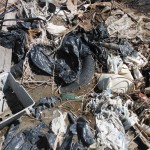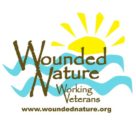 This photo was taken on one of America’s rural beaches at Gateway National Park in Jamaica Bay, New York. Unfortunately, many rural beaches that serve as critical wildlife areas look like this. This situation results in increased mortality for nesting sea birds, sea turtles, and endangered species.
This photo was taken on one of America’s rural beaches at Gateway National Park in Jamaica Bay, New York. Unfortunately, many rural beaches that serve as critical wildlife areas look like this. This situation results in increased mortality for nesting sea birds, sea turtles, and endangered species.
Ocean conservation non-profits all work in different ways to address marine-related issues. The four main ways ocean-related problems are addressed are through advocacy, education, remedial action, and research. Most people who care about our oceans, and donate, do not understand the difference. Donors respond and give on an emotional level to a non-profit’s advertisement rather than their mission focus. We want to explain each segment of the ocean non-profit sector and how it relates to restoring coastal areas to their original pristine condition.
Advocacy Groups. These groups focus primarily on having new laws and international treaties written and implemented. They spend most of the year traveling and collaborating at resorts around the world. Advocacy groups play an important role in issues such as international fishing quotas, the open seas, and cross-border pollution. Many people in the ocean advocacy field do not want the issue they are working on solved. If the problem were to go away, so would funding in future years and their jobs. Most advocacy groups stage one annual cleanup in an easy-to-access public place to keep their name in front of the public. In the case of the photo above, passing new laws would not clean up this beach.
Educational Organizations. The best example of an educational organization is a public aquarium. There are two focuses within the marine educational non-profit arena. The first group (aquariums) is focused on educating the public about marine life and marine ecosystems.
The second group, which sometimes includes public aquariums, is issued-focused education. They will choose several issues to focus on. These issues do not necessarily reflect the biggest problems facing the marine environment today but they reflect issues where they believe they can obtain grants and use the issue to generate donations. Most educational organizations stage one annual cleanup in an easy-to-access public place to keep their name in front of the public. In the case of the beach photo above, informing the public that this problem exists will not clean up this beach.
Remedial Action Groups. Remedial action involves physically fixing a problem and trying to return the ocean and its coastal areas to their original, pristine condition. Many ocean-related problems have been identified but few are being fixed.
REMEDIAL ACTION IS THE CORE FOCUS OF WOUNDED NATURE-WORKING VETERANS.
Physically removing trash is the only way to clean up our nation’s beaches. Some remedial action groups do not want their problem to go away because it would eliminate funding and their jobs. Wounded Nature-Working Veterans would like to get into every high tide area that has never been cleaned and eliminate the need for the organization. We would then have a staff of accomplished doers who would be easy to place with companies and other nonprofits.
Research Organizations. Most ocean-related research studies are multi-year with a baseline developed in the first year. Research studies are currently being conducted on marine-related species population levels and mortality rates, rubber, plastics, bacteria, and chemicals in coastal and offshore waters.
Once a baseline is developed, fluctuations from year to year are monitored. Many of these research studies will remain in place until the problem is corrected. The vast majority of marine research studies never get read outside of the entity conducting the study. Studying the trash will not clean up this beach.
Industry Run Ocean Non-profits. These are nonprofits with clever names that make the public believe they are protecting the environment. In reality, they are there to protect their members. They sponsor annual cleanups to collect contact information from individuals who care about the environment. When there is an issue regarding a member or a member’s products, they use this list to present their side of the issue to the public.
Wounded Nature-Working Veterans works year-round to clean up America’s coastal areas. Most of these areas can only be reached by boat and include rural beaches, tidal marshes, and high tide line collection points. Our work results in reducing the deaths of sea turtles, dolphins, sharks, and marine life. Cleaning these wildlife habitats results in increased recreational and commercial seafood production including clams, oysters, shrimp, and fish. Boats are usually needed on our cleanups making our cleanups expensive to conduct.
See our YouTube video on how Wounded Nature-Working Veterans is Making a REAL Coastal Difference.
Your donation can place a volunteer on the coast and help remove another cubic yard of litter and debris creating a small stretch of pristine beach and coastal area where wildlife breed and live.
